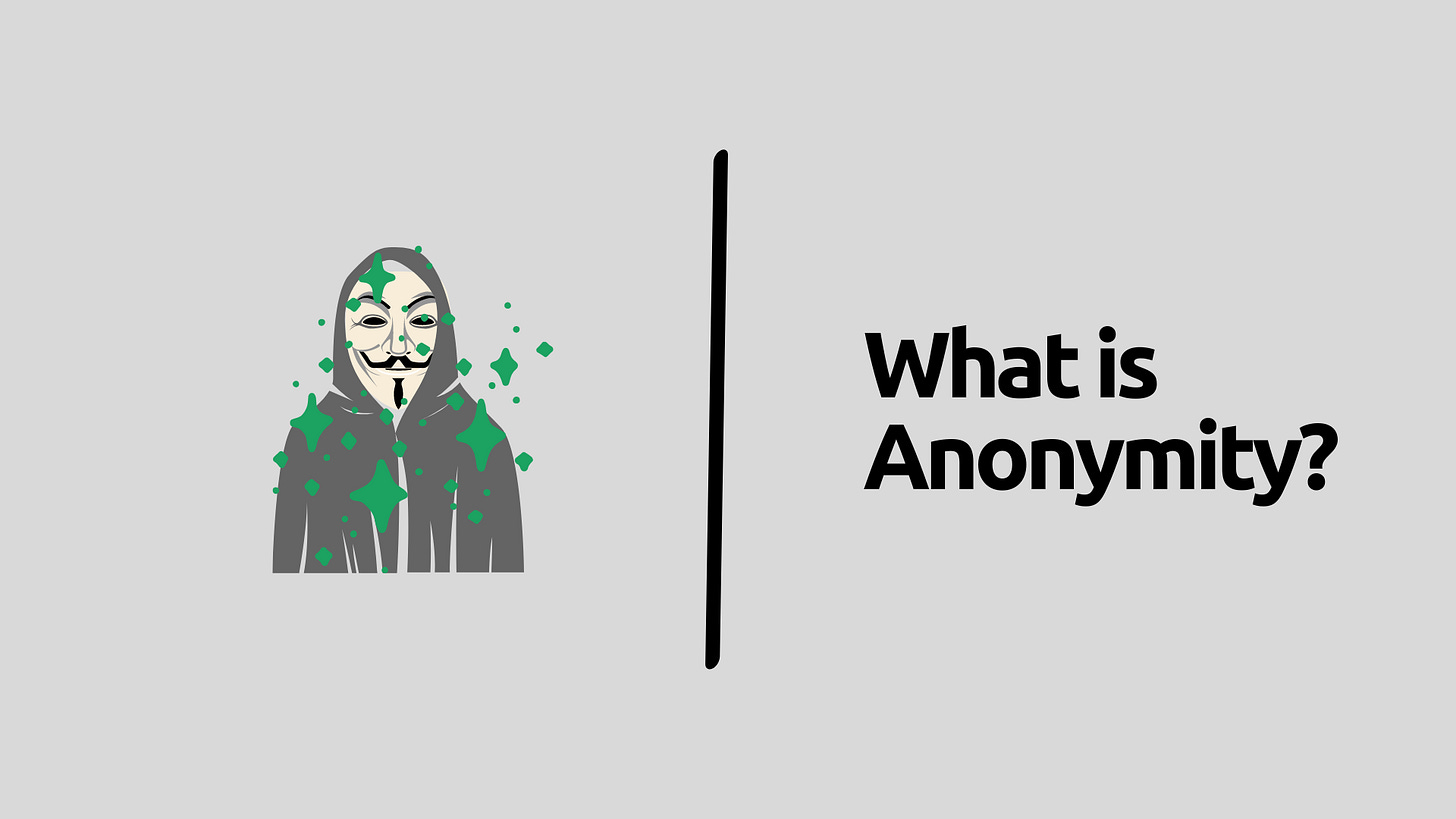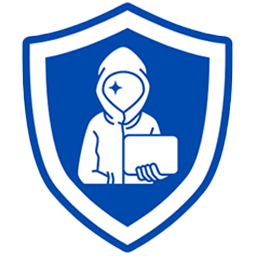No. This article is not about incognito mode in your trusty browser.
Do you want to experience the thrill of being a secret agent without all the danger and drama? Do you yearn to feel like James Bond, but without the high-speed car chases and deadly gadgets? Anonymity might just be the spy fantasy you've been waiting for. It's like putting on a cloak of invisibility without any of the hassle of being a wizard. So buckle up, because we're about to dive into the coolness of being unknown, unseen, and undetected.
1) What is Anonymity?
First off, anonymity is when someone is able to keep their identity hidden or secret. It usually goes hand in hand with privacy and security.
Anonymity is seen as a technique, or a way of realizing certain other values, such as privacy, or liberty.
The main idea is that a person is non-identifiable, unreachable, or untrackable by completely blending in with others.
Anonymity doesn’t mean that your activity is not being recorded; or tracking measures are not being taken, but it simply means that any action you do while anonymous should in an ideal world, never lead back to you.
Anonymity is like being part of a big herd of sheep. Each sheep in the herd looks the same and acts the same as all the other sheep, which can make it hard to tell them apart. Similarly, when you're anonymous, you blend in with everyone else and it can be hard for others to identify you.
But being part of a herd of sheep isn't always a bad thing! Sometimes it's safer to blend in with the rest of the flock so that predators can't single you out. Similarly, being anonymous can help protect you from people who might want to harm you for speaking out or sharing your opinions.
Just like how some sheep might want to stand out from the flock and do their own thing, some people might want to share their ideas and opinions without being anonymous. But for others, anonymity is the way to go. It all depends on what you're comfortable with and what you think is best for your safety and well-being.
2) How can I achieve anonymity?
Achieving true anonymity is nearly impossible as it is always possible for someone to uncover your true identity if they have enough resources and determination.
For example, even if you use the Tor browser to access the internet, your activity can sometimes still be monitored by other parties who may be able to identify you based on your behavior, metadata, or other factors.
Additionally, there is always the risk of user error, such as accidentally revealing your identity or leaving a digital trail that can be traced back to you.
However you, the average user, should probably not worry about any of that unless you have a high threat model or you’re being actively targeted by some government or organization.
The easiest out-of-the box way to achieve anonymity while surfing the web is by using the Tor Browser.
You see, when you use the internet, websites and people can see where you are and what you're doing. But with Tor, it's like you're wearing a disguise and nobody knows who you really are or where you're really from.
So how does it work? It's kind of like passing a message through a bunch of different friends before it gets to the person you want to talk to. Each friend only knows the friend before and after them, so nobody knows the whole message or who it's from. That's what Tor does with your internet activity, it bounces it through a bunch of different computers all around the world so nobody can trace it back to you.
Make sure to not do any actions that would lead back to you such as logging in to an account or visiting your own profiles or else your identity would be compromised.
Another easy way to have some degree of anonymity is by utilizing Pseudoanonymity.
So, you know how sometimes you play games or post things online and you use a fake name or a username instead of your real name? Well, that's sort of like what pseudoanonymity is.
Pseudoanonymity means that when you create an account, you use an email, name or an ID that isn't your real name, but people might still be able to figure out who you are based on other information. For example, if you use the same username on different websites and you post similar things, someone could figure out that it's the same person behind both accounts.
It's kind of like wearing a mask at a masquerade ball. People might not know your real name or what you look like, but if you talk and act the same way as you do in real life, they might be able to guess who you are.
However for the majority of people, using pseudonyms is a good way to anonymize information you give to companies, such as when you sign up for a service you only plan on using temporarily, or that scary email newsletter you don’t want to give your real email to. (PS: we accept pseudonyms).
Services like Simple Login can be used to set up email aliases.
In the coming articles, we will dive deep into the world of Tor and Simple Login to uncover all the tricks and tips to keep you anonymous and safe online.
3) What are the benefits and drawbacks of anonymity?
Anonymity can be pretty cool. It lets you say what's really on your mind without worrying about getting in trouble. It's like wearing a mask to a party, you can let loose and have fun without anyone knowing who you are. Whistleblowers can use anonymity to reveal secrets about the bad guys without getting caught. Activists can also use anonymity to organize protests and keep the man from spying on them.
But hold on to your hats, anonymity also has some serious downsides. It can give bad guys a way to do some seriously shady stuff like cyberbullying and spreading fake news. Some people can use anonymity to be mean and hurtful to others because they don't have to face the consequences of their actions. It's like throwing eggs at someone's house and running away before anyone sees you. Anonymity can also make it hard to know who's responsible for what, making it tough to hold people accountable for their actions. So, like everything else, anonymity has its pros and cons.
4) Where is anonymity used?
Anonymity and politics:
Anonymity in politics can refer to different things. One way anonymity is used is through the use of anonymous sources in journalism, where a reporter or a whistleblower may not disclose the identity of a source for fear of retaliation or harm. Another way anonymity is used in politics is through anonymous online forums and chat rooms, where individuals can discuss political issues without revealing their identities. This can be useful for activists who want to organize protests and rallies without being surveilled or harassed. However, anonymous speech can also be used to spread false information and hate speech, so it's important to be critical of information from anonymous sources.
Anonymity and technology:
Anonymity is also relevant in the technology world. With the rise of blockchain technology and cryptocurrency, anonymous transactions have become possible. While this provides a degree of privacy and security, it has also been used for illegal activities such as money laundering and the purchase of illegal goods on the dark web. Additionally, some websites and online services offer anonymous browsing or messaging options to their users. This can be helpful for individuals who wish to keep their online activities private, but it can also enable cyberbullying and harassment.
Real-world applications:
Anonymity has been used by whistleblowers to expose corporate wrongdoing and government misconduct. For example, Edward Snowden leaked classified information about the U.S. government's surveillance programs in June 2013, revealing the extent of government surveillance on citizens.
Anonymous online forums have been used to organize and coordinate political action, such as the Arab Spring protests in 2010 and 2011.
Some individuals use anonymity to protect their identity, such as victims of domestic violence or individuals living under oppressive regimes.
Journalists may use anonymous sources to protect the identity of individuals who provide sensitive or potentially damaging information.
Anonymous social media accounts have been used to coordinate political protests and to share sensitive information without revealing the identity of the poster.
— Congratulations! You have successfully made it to the end of this article on anonymity. Now that you know all about the ins and outs of anonymous browsing, you can finally leave your grandma's house and start exploring the internet like a real rebel. Just remember to use your newfound anonymity powers for good, and not for evil. See you later, ShieldUp!







